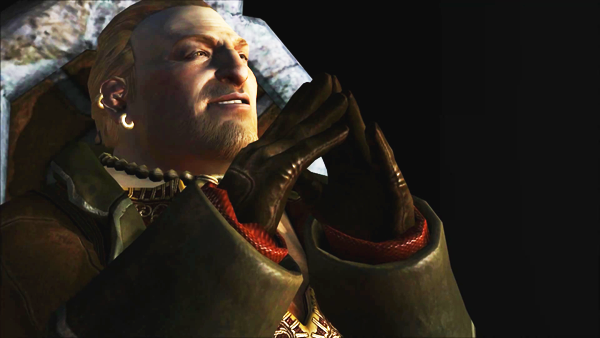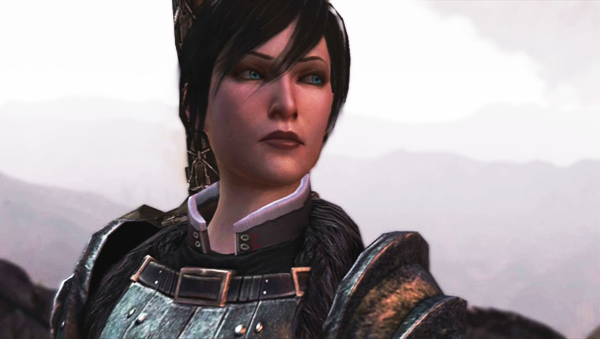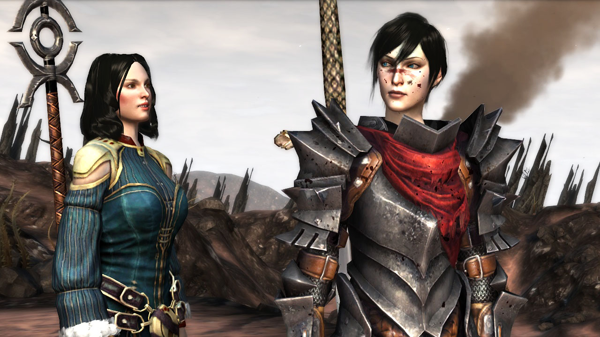About a month ago, I finally gave up trying to finish Dragon Age: Origins and just skipped straight on to Dragon Age II—and Maker’s breath, am I ever glad I did, because it was amazing. A character-driven, darker and grittier sequel set in one unholy mess of a city over the span of ten years? You can keep all your epic quests and your goofy Grey Wardens, I’m going to go hang out with the gang in The Hanged Man for the rest of my days.
Naturally, one of the first things I did once I finished was to go online and try to find all the memes and fanart and things that I’d scrolled past in confusion before playing the game, but which would now finally make sense. Coming straight out of a playthrough that had dominated my free time for the entire past month, it was pretty jarring to discover that, of course, not everyone had the same playthrough as me. Most of what I found was Garret Hawke/Fenris shipping, or people drooling over Anders, or Cassandra and Varric Dragon Age: Inquisition stuff that was confusing at best and spoilery at worst.
What I was seeing wasn’t my playthrough; the warrior Marian Hawke taking names and snarking at people with Varric at her side, who sided with the mages at every turn out of undying love for her sister, and who really thought she could’ve smoothed out everything with the Arishok bloodshed-free if he’d just come by The Hanged Man for a drink or nine.
Ultimately, I was left grumpily pondering one of the fundamental questions of fandom, especially with interactive media: what made my playthrough any more or any less legitimate than all these others?
As with most video games, my playthrough—as it stands in my memory—is actually a combination of fixed canon, player-dependent canon, optional canon, and headcanon. Any game with this level of story complexity is likely to run this gamut of canonicity. Fixed canon were things I had no control over, like the Hawke family fleeing to Kirkwall, or Anders sending the Chantry skyward. Player-dependent canon was anything I did have control over, whether knowingly (romances, dialogue, allegiances) or unknowingly (bye bye, Carver).
Optional canon was all the stuff packed in there that I just as easily could have missed or skipped (or, in the case of party banter, sat around for hours listening in and giggling). And, last but not least, there were my headcanons—most of them related to my obsessive love for Hawke and Varric’s relationship. (“I don’t know what I even ship them as,” I recall lamenting to my roommates halfway through Act I, “but I’m shipping the hell out if it.”).
A playthrough, then, is a complicated series of interactions between player and game, the fundamental relationship that’s different for everyone, but which will ultimately make or break their gaming experience. Or, to put it in DA2 terms, it’s the interactions between those unreliable narrators: Varric and Hawke.
Obviously, Varric is a narrator; to what degree he’s unreliable is certainly a matter up for debate. “In case you hadn’t noticed,” he jokes in Act III, “I lie a lot.” But if Varric’s the one telling the whole story, is the entire game a lie? Including him admitting he’s a liar? If he’s lying when he says he’s a liar, then he must actually tell the truth, but then … hang on, I need another tankard of ale to think that one through.
All joking aside, Varric is the character who conveys the game’s canon to the player—from Hawke fleeing Lothering to Hawke’s final days in Kirkwall. I’ve seen some amazing headcanons people have come up with that excuse a variety of the game’s flaws or quirks as being a limitation of Varric’s narrative style (Varric only ever bothers to describe one cave because he hates the outdoors, extra waves of enemies are Varric trying to make the battles sound more impressive, etc).
Even in scenes where he’s not present, we’re still ultimately relying upon Varric’s interpretation of the situation because there’s no one else around in the present who can confirm or deny what he says. Without Varric, there is no story, and without the story, there is no game.
But Hawke’s a narrator, too, from the player’s side. What does Hawke say in any given situation? Who do they ally themselves with? Who will live and who will die, who will be romanced and who will be the first to leave Hawke’s side? These are all decisions made by the player, and as such, they’re something Varric has no control over. And while Hawke makes no claims of falsehood or truthfulness, their narration is ultimately just as unreliable as Varric’s.
My playthrough is not your playthrough or anyone else’s; in fact, it’s not even completely the playthrough that was presented to me on the screen. It’s informed by everything I decided or noticed (or failed to notice) during the game. Even if I played the game again, making exactly the same decisions at every single moment of the game (and trust me, my memory’s not that good), I’d be entering the game with preconceptions and readings that I didn’t have the first time.
Reliable or not, it’s the negotiation between Varric (the game) and Hawke (the player) that makes Dragon Age II the masterpiece of interactive storytelling that it is. As Varric so patiently explains to Cassandra, no single person is responsible for everything that happened in Kirkwall. And no single person is in complete control of the story in DA2. Finishing the game does not, in fact, give the player “the whole story,” just a whole story. And if you want to experience one of the countless other versions … well, that’s just as good an excuse as any to start playing the game all over again.



Glad you liked it! I’ve played DA2 countless times and somehow I only cemented my Hawke’s personality rather than tried different playthroughs xD
LikeLike
I’m the odd one that started Dragon Age with Inquisition, and THEN went back to Origins and DA:2. I had a weird blank slate in Inquisition and decided to play as a clueless ignorant noble, who’d spent more time in the woods than with her tutors. I was really careful and diplomatic the first time, slightly less diplomatic the second time through, and then…I played Origins as a Brosca dwarf.
By the time I played DA:2 my Hawk was a snarky mess, and purple all the way. If I had started with DA:2 my Hawk would have been completely different.
There’s a limit to how rude I will knowingly play, though sometimes the dialog comes out completely different than what you were expecting your character to say. Did my character just say that?! I guess she did. Ah…well….let’s see how this goes?
LikeLike